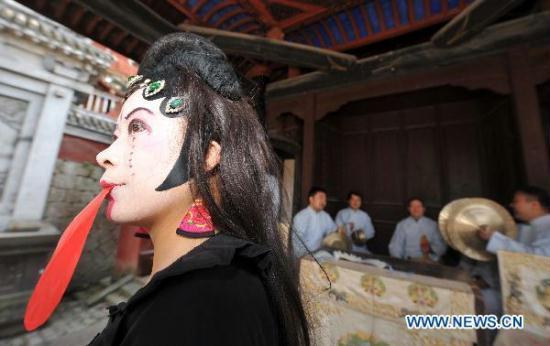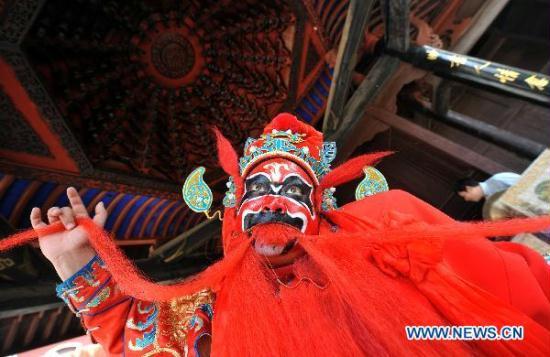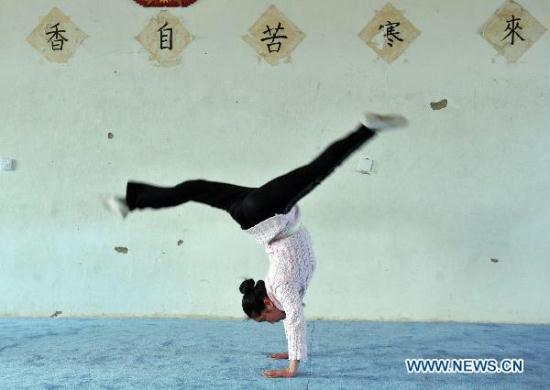-
-

Calm&Chaos
For the past few days Li Qingda's life has felt like being in a Hollywood action flick ? surviving a 9.0-magnitude earthquake and escaping possible nuclear radiation. Li is a 21-year-old law student at Sendai's Tohoku University, located close to the epicenter of the earthquake that struck off the coast of Japan on Friday. It spawned a tsunami that swallowed up whole villages and towns, killing at least 3,600 people, with more than 7,800 still missing.
-

Childcare
Just like new moms, new fathers can be depressed, and a study found a surprising number of sad dads spanked their 1-year-olds. About 40 percent of depressed fathers in a survey said they'd spanked kids that age, versus just 13 percent of fathers who weren't depressed. Most dads also had had recent contact with their child's doctor ?a missed opportunity to get help, authors of the study said.
-

A SAD fact
Before finally accepting a position as department head, Wu Ting turned down three promotion opportunities in the past 20 years just so she could avoid giving presentations at large gatherings.
-

-

-

-
-
Key Words
Tea Peking Opera
Confucius
Cultural Heritage
Jade Chinese New Year
Imperial Palace
Chinese Painting
Heritage
Chinese "ghost opera" revives in recent years
(Xinhua)
Updated: 2011-03-17 10:52
 |
Large Medium Small |
|
 |
|
An actress performs the Mulian Opera in Xinchang County, east China's Zhejiang Province, March 14, 2011. It was the first Mulian Opera performance in Xinchang since 1996. The Mulian Opera, is also called "Guixi", meaning "ghost opera" in Chinese, as most of players perform with ghost-like make-ups. As one of the oldest Chinese theatric genres, it refers to the tale about Mulian saving his mother, a major play performed in the opera. As time goes on, the Mulian Opera has become an integration of folk stories, sideshows and acrobatics. However, the opera has been dying since 1980s as fewer people were interested in it. It has been listed as one of the national intangible cultural heritages in 2006 and become revival in recent years as more people found its cultural values. (Xinhua/Wang Dingchang) |
 |
|
An actor performs the Mulian Opera in Xinchang County, east China's Zhejiang Province, March 14, 2011. It was the first Mulian Opera performance in Xinchang since 1996. The Mulian Opera, is also called "Guixi", meaning "ghost opera" in Chinese, as most of players perform with ghost-like make-ups. As one of the oldest Chinese theatric genres, it refers to the tale about Mulian saving his mother, a major play performed in the opera. As time goes on, the Mulian Opera has become an integration of folk stories, sideshows and acrobatics. However, the opera has been dying since 1980s as fewer people were interested in it. It has been listed as one of the national intangible cultural heritages in 2006 and become revival in recent years as more people found its cultural values. (Xinhua/Wang Dingchang) |
 |
|
A girl practises basic skills of the Mulian Opera at an art school in Xinchang County, east China's Zhejiang Province, March 14, 2011. It was the first Mulian Opera performance in Xinchang since 1996. The Mulian Opera, is also called "Guixi", meaning "ghost opera" in Chinese, as most of players perform with ghost-like make-ups. As one of the oldest Chinese theatric genres, it refers to the tale about Mulian saving his mother, a major play performed in the opera. As time goes on, the Mulian Opera has become an integration of folk stories, sideshows and acrobatics. However, the opera has been dying since 1980s as fewer people were interested in it. It has been listed as one of the national intangible cultural heritages in 2006 and become revival in recent years as more people found its cultural values. (Xinhua/Wang Dingchang) |
 |
|
An actor performs the Mulian Opera in Xinchang County, east China's Zhejiang Province, March 14, 2011. It was the first Mulian Opera performance in Xinchang since 1996. The Mulian Opera, is also called "Guixi", meaning "ghost opera" in Chinese, as most of players perform with ghost-like make-ups. As one of the oldest Chinese theatric genres, it refers to the tale about Mulian saving his mother, a major play performed in the opera. As time goes on, the Mulian Opera has become an integration of folk stories, sideshows and acrobatics. However, the opera has been dying since 1980s as fewer people were interested in it. It has been listed as one of the national intangible cultural heritages in 2006 and become revival in recent years as more people found its cultural values. (Xinhua/Wang Dingchang) |




